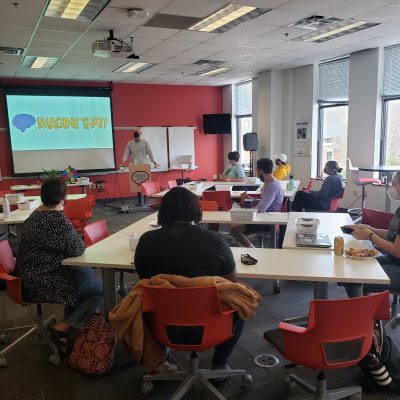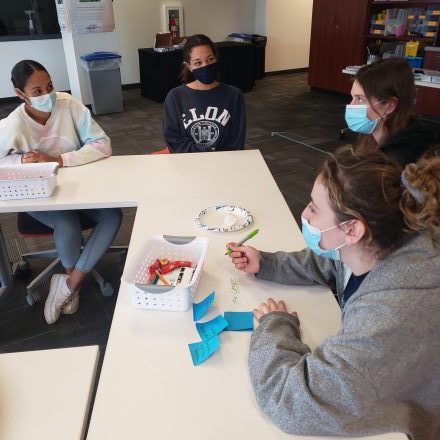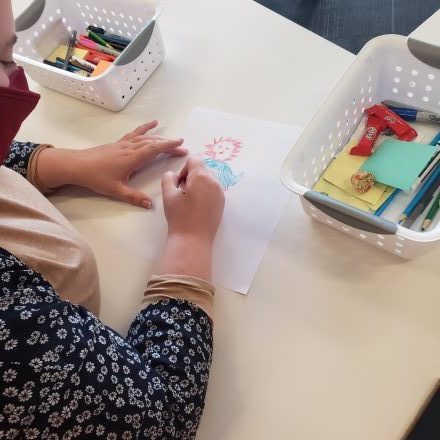The Center for Design Thinking and Elon parent Scott Duncan present "Imagine That!," a game to help catalyze student motivation towards team- and challenge-based learning.
How might we catalyze student motivation towards team- and challenge-based learning?
This is a question that consistently plagues teachers. Elon parent Scott Duncan and the Center for Design Thinking have designed an answer. It’s called “Imagine That!” – an engaging team-building and communication-enhancing class activity structured as a classic game show.

As a customizable activity, Imagine That! puts students into a fun, energetic environment in which they design interventions into real issues of central importance to their course.
On Friday, Feb. 18, Scott led a session at Elon’s Center for Design Thinking for over a dozen students.
Central to any team-based process, the game show begins with naming one’s team and cultivating a vision. Team names were “Mind Benders,” “Grapefruit Unicorn” and “Imaginative Innovators” and each team launched prototypes designed to thwart Mind Block Mouse and empower problem-solving capacities for all students.
Then the game really began. Over the course of an hour, students were prompted with a rather unconventional way of formulating ideas for how to improve their overall productivity at the Center for Design Thinking.
The challenge guiding their visioning? Design a superhero to catalyze playful idea generation and exploration for students across campus.

Each group was given just eight minutes to generate ideas for this ideal superhero’s abilities, features, backstory, potential villains and sidekicks amongst other traits.
With just eight short minutes of idea generation, the results were astounding. Each of the three groups came up with a Design Thinking superhero possessing unique traits and abilities. What was most interesting, however, was the overlap between the three teams’ superheroes.
The one commonality between all three superheroes was the quality of being ever-and-fully-present. During post-game reflection, students noted that in an ideal world, we are all able to truly be there for one another and lead with both courage and empathy.
A second common superhero ability focused on the skill of seeking to understand, instead of leaping to solutions for others. Students noted the need to ask questions and provide methods from which others can explore and solve their own problems.

Imagine That! is a fun way to reinforce a critical concept that real-world problem solving doesn’t always have to start off with supposedly “legitimate” solutions. Tapping into the creative and other-worldly side of problem-solving is an extremely effective way to generate ideas subconsciously for a problem you may actually deal with.
In this case, the Center for Design Thinking designed three superheroes that could essentially solve all of the tasks and issues they face in their work as Design Thinking Catalysts. In further reflection, students took the other-worldly ideas and applied them to their day-to-day lives in the center and at Elon, thinking about what parts of these superpowers are attainable in the here and now.
As a design thinking enthusiast, former screenwriter, non-profit board leader and business consultant, Duncan has offered these opportunities to businesses, nonprofits and college students in this interactive and unique approach to improving effectiveness and fostering innovation. Duncan tailors the creative challenges to the needs of the participants, so every session is unique. But one thing remains constant, Imagine That! makes learning fun!
Check out Imagine That! on Zoom and reach out to the Center for Design Thinking by emailing elonbydesign@elon.edu.


